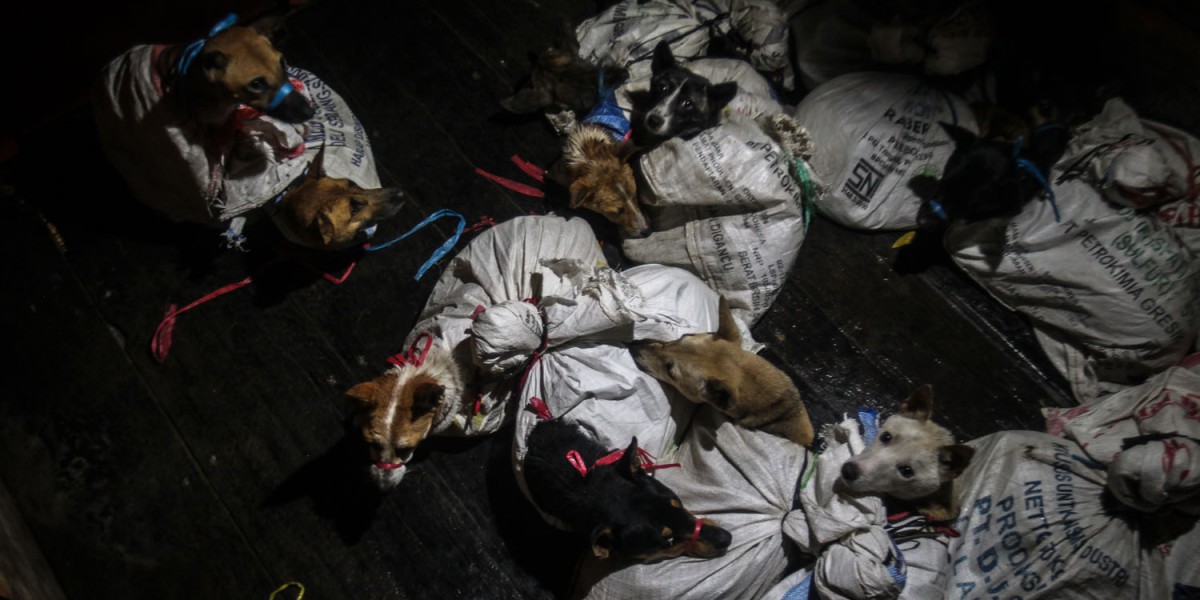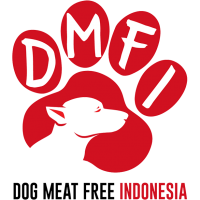
Police in Indonesia intercept a notorious dog meat trader, saving 53 terrified dogs awaiting slaughter
Dog Meat Free Indonesia campaigners applaud authorities cracking down on those trafficking thousands of dogs for meat every month
Police in Sukoharjo infiltrated a dog trafficking operation in Java in order to move in on the trader and dog butcher who has allegedly been at the centre of the dog meat trade spanning the island of Java for more than 20 years. He is suspected of coordinating shipments of hundreds of dogs for slaughter every month, and killing on average 20 dogs every day. Campaigners from the Dog Meat Free Indonesia coalition, which campaigns for a nationwide ban on the dog and cat meat trades, were at the scene to help rescue any dogs found alive.
The sting operation took place in the early hours of the morning on 24th November as the truck loaded with 53 terrified dogs arrived at the slaughterhouse. DMFI campaigners found the dogs tied up in hessian sacks, their mouths tightly bound with string and cable ties. Most of the dogs were emaciated, and less than one year of age, and one dog had sadly died on the gruelling journey.
Lola Webber, from DMFI member group Humane Society International, was one of the first on the scene. She says: “My heart was pounding in my chest as we approached the truck, because I could hear the dogs’ pitiful whimpering and then saw them all tied up in sacks, their soft muzzles squeezed shut with wire. They were extremely traumatised and frightened. Many of them were still wearing collars, and were no doubt many miles from home, likely stolen pets grabbed from the streets. They will have endured the most horrific and terrifying journey, thrown in the back of a truck to be taken to this disgusting and filthy slaughterhouse where they would have been bludgeoned over the head and their throats cut. To think of the fear they must have endured is just devastating. We got there just in the nick of time because the killing usually happens in the early hours. We are immensely grateful to the authorities for taking action. For those of us who have been campaigning for so long to end this cruel trade, it was a huge privilege to be able to rescue these animals.”

This is only the second major dog meat trade bust by the police in Indonesia, marking what DMFI campaigners hope signals a turning point in their campaign to see the brutal and dangerous trade banned nationwide. Despite a national government pledge to crack down on the dog meat trade, it has been isolated regional governments and regencies that have so far taken the initiative to protect Indonesians from the trade. Regencies and cities such as Karanganyar, Salatiga and Sukoharjo have passed explicit bans in their jurisdictions, and DMFI hopes that another arrest and eventual prosecution will send a strong signal to other dog traders that their activities are illegal and will be punished. Last month a dog trader caught by Kulon Progo District Police was sentenced to 10 months in jail and a $USD10,000 fine (150 million IDR) after authorities intercepted his truck illegally transporting 78 dogs from West Java for slaughter and human consumption throughout Central Java..
Mr. Tarjono Sapto Nugroho, Head of Crime Investigation of Sukoharjo police says: “We receive many complaints about illegal dog meat traders’ operations. People do not want this trade or slaughter in their communities. Dogs are friends, not food, and the trade is already illegal and is strictly prohibited by Islamic law. Dog meat consumption is considered culture by some, but cultures evolve and so must we. So we initiated this interception and confiscation to protect our communities and to support the Central Javan government’s efforts to eradicate the dog meat eating culture and trade.”
The Dog Meat Free Indonesia coalition has conducted numerous investigations since 2016, exposing the brutal reality of the trade in dogs destined for human consumption. Every month, tens of thousands of these dogs are transported across Indonesia, often crossing provincial borders and in so doing, jeopardizing anti-rabies measures because of the dogs’ unknown disease status. Many dogs die during this horrific journey from heatstroke, dehydration or injuries inflicted during capture and transport.
Karin Franken from Jakarta Animal Aid Network, who attended the raid, says: “As well as being unspeakably brutal, it’s easy to see how this trade is a public health danger too. Rabies is a grave concern in Indonesia, and Central Java is one of only eight provinces declared rabies-free, so the cities and regencies here such as Solo where thousands of dogs are slaughtered and sold in local restaurants every month, are jeopardising their rabies-free status and the health of the communities by allowing this trade to continue. This raid by the police force and a zero-tolerance approach by the authorities is absolutely vital to protect citizens from the public health risk posed by the dog meat trade. We now need other regencies and provinces across Indonesia to follow this lead and crack down on this dangerous and illegal trade.”

The 53 dogs rescued from the slaughterhouse received emergency veterinary treatment from the DMFI team before travelling to DMFI’s temporary shelter where they will receive loving care to get them back to health. The chances of being able to reunite them with their families is likely to be slim, but DMFI will make local appeals. The plan is that some of the dogs will be adopted locally among Indonesia’s passionate dog-loving community, while others will be flown to Humane Society International’s temporary shelter in Canada from where the organisation hopes to find them forever homes.
Opinion polls consistently show that the vast majority of Indonesians don’t eat dog, with a mere 4.5% of the population doing so, and 93% of Indonesians in support of a ban nationwide.
Police confirmed at the scene that they anticipate the suspect will be prosecuted later this year for violating the Law of The Republic of Indonesia Number 41 Year 2014, Article 89, regarding Animal Husbandry and Animal Health, with penalties of at least two years and maximum five years imprisonment, and/or a fine at least 150,000,000 Rupiah ($USD 10,500). The police have also pledged to further investigate others involved in illegal operations involving the trade and slaughtering of dogs throughout their jurisdiction.

